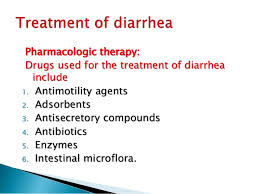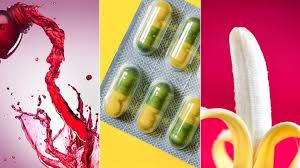Most cases of diarrhea clear on their own within a couple of days without treatment. If you’ve tried lifestyle changes and home remedies for diarrhea without success, your doctor might recommend medications or other treatments.
Treatment to replacement of fluids
Your doctor likely will advise you to replace the fluids and salts. For most adults, that means drinking water, juice or broth. If drinking liquids upsets your stomach or causes diarrhea, your doctor might recommend getting fluids through a vein in your arm (intravenously).
Water is a good way to replace fluids, but it doesn’t contain the salts and electrolytes — minerals such as sodium and potassium — you need to maintain the electric currents that keep your heart beating. You can help maintain your electrolyte levels by drinking fruit juices for potassium or eating soups for sodium. Certain fruit juices, such as apple juice, might make diarrhea worse.
For children, ask your doctor about using an oral rehydration solution, such as Pedialyte, to prevent dehydration or replace lost fluids.
Adjusting medications you’re taking
If your doctor determines that an antibiotic caused your diarrhea, your doctor might lower your dose or switch to another medication.
Treating underlying conditions
If your diarrhea is caused by a more serious condition, such as inflammatory bowel disease, your doctor will work to control that condition. You might be referred to a specialist, such as a gastroenterologist, who can help devise a treatment plan for you.
Medicines:

Anti-motility medicines:
Anti-motility medicines (sometimes called anti-diarrhoeal medicines) can help slow down the diarrhoea. These medicines may be useful in relieving symptoms of mild or moderate diarrhoea if short term control is needed, for example during travel. These medicines can be obtained from pharmacies.
Anti-motility medicines should not be used if you have severe or bloody diarrhoea and may be dangerous in this instance. They should never be used to treat diarrhoea in infants and children.
Available products include:
- Loperamide (e.g. Gastro-Stop, Imodium, Stop-It); and
- Diphenoxylate and atropine (e.g. Lomotil, Lofenoxal).
These medicines may worsen bacteria-induced diarrhoea, and may cause drowsiness. Alcohol should be avoided.
Antibiotics:
Antibiotics are prescribed only in some cases of diarrhoea that is caused by bacteria or parasites. Your doctor may request a stool sample to test for bacteria or parasites before starting antibiotic treatment.
Supplements:
If you’ve had an episode of gastroenteritis, you may benefit from taking probiotics.






